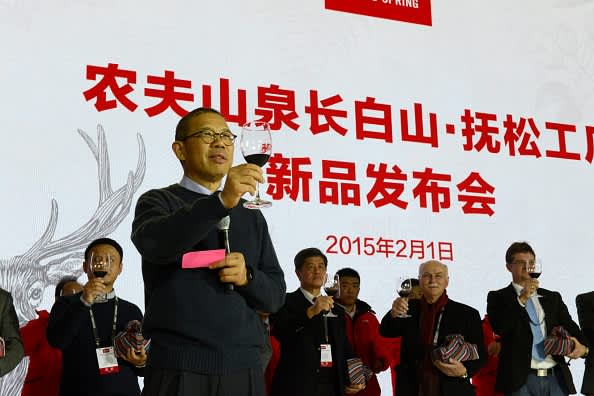Nongfu Spring’s founder briefly becomes China’s richest man, thanks to a huge stake in bottled water IPO

Zhong Shanshan, the chairman of Nongfu Spring Company, attends the Nongfu Spring new product launch conference on February 1, 2015 in Baishan, Jilin Province of China.
Jiang Xin | VCG | Getty Images
BEIJING — The public offering of a bottled water giant has propelled its founder into the ranks of the three richest people in China, thanks to an ownership structure that reflects some potential risks of investing in Chinese companies.
Nongfu Spring, which claims the top spot in China’s packaged drinking water market, raised about $1.1 billion in its initial public offering in Hong Kong on Tuesday, marking one of the largest IPOs for the stock exchange so far this year. Shares briefly surged 85% from the offering price to open at 39.80 Hong Kong dollars ($5.14) before closing about 53.9% higher at 33.10 Hong Kong dollars ($4.27) a share. The stock traded about 2.5% higher on Wednesday.
With 84.4% ownership of Nongfu Spring, founder Zhong Shanshan saw his wealth balloon on paper. Zhong had a total net worth on Tuesday morning of about $59 billion, based on a price of 39.20 Hong Kong dollars per share and counting his other holdings, according to Forbes.
At that level, Zhong was temporarily the richest man in China, topping the $57 billion of Tencent’s Pony Ma and $51 billion net worth of Alibaba founder Jack Ma, per Forbes analysis. Zhong was on track to be the third richest man in the country ahead of the IPO, according to Wind Information.
The flip side of Zhong’s massive wealth is that public holdings of Nongfu account for less than 4%, according to the company’s prospectus.
“In view of the high concentration of shareholding in a small number of Shareholders, Shareholders and prospective investors should be aware that the price of the Shares could move substantially even with a small number of Shares traded, and should exercise extreme caution when dealing in the Shares,” the company warned in a filing.
Broadly speaking, such low percentages of publicly offered shares and high levels of founder ownership are not uncommon for Chinese companies.
In contrast, for most listings of U.S. companies, “it is unusual for the founder or the founding team to own more than 50% by the time the firm (goes) public,” Martin Kenney, a co-director at the Berkeley Roundtable on the International Economy and a distinguished professor of Community and Regional Development at the University of California, Davis, said in an email.
He did note that for very successful U.S. start-ups, the founders don’t need to give up as much equity and can often hold onto about 30% or 35% past the initial public offering. But for “Chinese IPOs these high levels of holding are not unusual,” Kenney said. “Moreover, because these are (special holding structures such as) VIEs/WOFEs there are many unusual transactions and what in the US context looks like self-dealing (particularly in the case of spinoffs from other firms).”
While not a guarantee, a more diverse ownership structure can help guard against fraud.
“The blockholder (influential shareholder) could have so much control over the company, the internal or external auditing mechanism may not work as well as if there (was) a diverse shareholder base,” Zhu Ning, a professor of finance at Tsinghua University, said in a phone interview. “There could be some financial irregularities coming out of such ownership.”
Zhu noted that in his observation, the voting rights for large technology companies in the U.S. can be just as concentrated even if ownership is not.
The major difference between Chinese and U.S. financial markets remains regulation, he added, pointing out the punishment for securities law violation in China is relatively less severe than in the U.S.
Mainland Chinese stocks are among the best performers in the world this year. The CSI 300 is up more than 12.5% and the Shanghai composite has gained more than 5%, while the S&P 500 is up about 3% and Hong Kong’s Hang Seng is down more than 13%.
Expectations of relatively better returns from Chinese assets have also attracted foreign investors. The mainland Chinese financial markets have been difficult to access from outside the country, but the launch of stock connects with Hong Kong and the inclusion of some mainland shares in major global stock indexes has helped to gradually increase foreign exposure to Chinese stocks.




